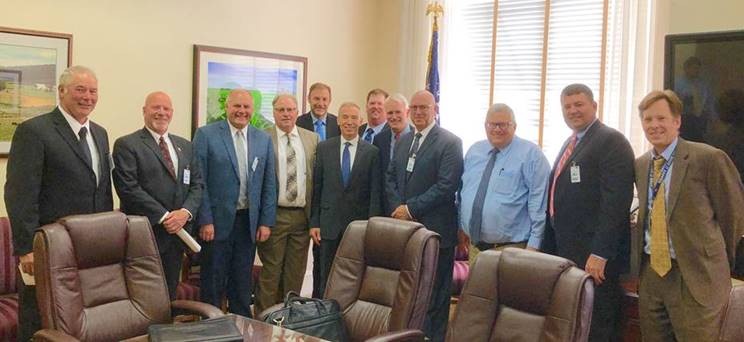A Seat at the Table Talking Trade Mitigation Funding
June 19, 2019Following the announcement in May of a second tranche of trade mitigation assistance in response to ongoing global trade tensions, USDBC was invited, along with four other agricultural trade groups, to Washington, DC to meet with USDA Deputy Secretary Steve Censky, Under Secretary for Farm production and Conservation Bill Northey, and USDA Chief Economist Rob Johansson. As dry beans were included in Market Facilitation Program (MFP) of direct payments in this second tranche of funding, this was a critical opportunity to reiterate that US dry beans have experienced price declines as a result of the retaliatory trade tariffs and should be included in the trade aid calculations at a value that accurately reflects the loss.

Joe Cramer and Clint Stoutenburg (fourth and second from right) represent USDBC at high level meeting with USDA.
Joe Cramer and Clint Stoutenburg of Michigan Bean Commission represented USDBC at this meeting and had the opportunity to present data and information demonstrating the correlation between prices of US dry beans with those such as soybeans and wheat that have had tariffs directly imposed by China. USDA was urged to ensure that the loss values attributed to dry beans is accurately calculated so that producers in counties where those crops are grown are not unfairly penalized. USDA indicated that the MFP is in the rule making process and therefore they could not disclose or discuss the specific numbers they are considering. Under Secretary Northey indicated that USDA did not expect to have a second round of the MFP, but that changed when negotiations with China broke down. He acknowledged the outcome won’t be perfect between commodities and won’t fully offset the losses, but is better than doing nothing. USDA indicated that more details would be provided in the coming weeks.
Following the meeting at USDA, the group also met with majority and minority committee staff for the Senate and House Agriculture Committees. These were information sharing meetings. The committees will be closely reviewing USDA’s proposed methodology and calculations when that information is provided. Some of the individual crop groups also met with House and Senate offices in their home states to keep those members informed of our concerns and requests for the MFP process. This was an important opportunity for USDBC to make our concerns known regarding the impact of ongoing trade tensions with China and other important trade partners.